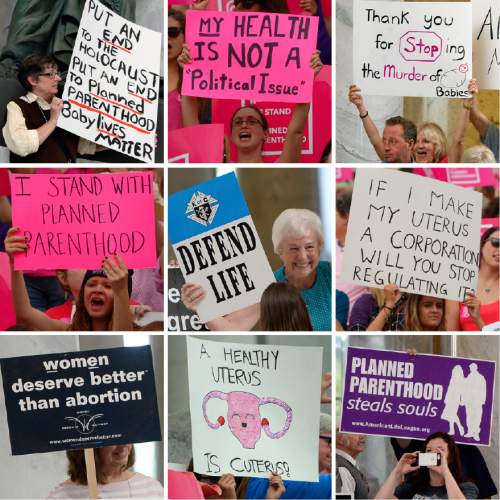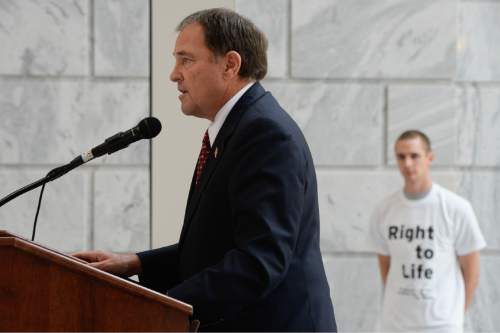This is an archived article that was published on sltrib.com in 2016, and information in the article may be outdated. It is provided only for personal research purposes and may not be reprinted.
Utah's governor stands by his order to block Planned Parenthood funding despite the fact that makers of the secret videos that spurred his move are now facing criminal charges.
Gov. Gary Herbert on Thursday rejected calls from Democratic lawmakers to reverse his directive, days after a Houston grand jury cleared Planned Parenthood and instead indicted the anti-abortion activists behind the footage.
"I don't feel duped by the videos," Herbert told reporters at the Capitol. Even though they were edited, Herbert said, "the videos are pretty self-explanatory."
The Republican governor said he was looking more to the outcomes of Congressional investigations and Utah's pending case than the Monday indictment of two abortion opponents with the Center for Medical Progress on charges related to records-tampering and buying human organs.
"The concern was, [is Planned Parenthood] violating the law — is their parent organization violating the law? We should not have to associate with somebody, an organization," he said, "that's violating the law."
Prior to the charges, Herbert's constituents were split on his decision.
Slightly more of the state's registered voters disagreed than agreed with the governor's move, according to results of a SurveyUSA poll commissioned by The Tribune and the Hinckley Institute of Politics at the University of Utah. Forty-six percent of participants — all registered voters from across the state — took issue with Herbert's August order cutting off $275,000 from the family-planning organization.
But 44 percent approved of the directive — a statistical tie given the survey's margin of error of plus or minus 3.2 percentage points.
The poll was conducted Jan. 6-13, two weeks before the grand jury's decision.
The support for the Utah affiliate was encouraging, said Karrie Galloway, CEO of the Planned Parenthood Association of Utah.
"I'm heartened that, even with a popular governor," Galloway said last week, "he cannot claim that the majority of Utahns agree with him. Because they don't."
Some poll participants had not decided where they stood as of the second week in January. Ten percent said they were unsure.
The results were divided along lines of political affiliation, religion, age and gender.
Members of The Church of Jesus Christ of Latter-day Saints tended to side with the governor, with 58 percent agreeing with the move. More than a quarter (28 percent) disapproved.
Non-Mormons decidedly disagreed with the order — 73 percent were against the decision and 23 percent backed it.
When it comes to age, Herbert's action against Planned Parenthood logged the lowest rate of approval among 18- to 34-year-olds, at 37 percent, and the highest among people older than 65, at 50 percent.
Younger voters were more likely to be unsure where they stood: 15 percent said they were wavering, as opposed to just 4 percent of voters over 65.
Women took greater issue with the order than men. Forty-one percent of women approved and 48 percent disapproved. Among men, 47 percent approved and 45 said they disapproved.
Sixty-nine percent of Republicans approved; 20 percent disapproved. Democrats were overwhelmingly unsympathetic to the governor, with only 10 percent approving and 86 percent disapproving. Unaffiliated voters were more divided, with 34 percent approval and 56 percent disapproval.
House Democrats on Thursday called for Herbert to double back on the order, saying he had reacted to a "heavily edited, highly political video" and that Monday's indictments showed that Planned Parenthood has acted legally and provides necessary health services.
"In essence he's punishing the local affiliate," said Rep. Rebecca Chavez-Houck,"for what he saw as the national association's coloring outside the lines."
The Salt Lake City Democrat said she believes the move could have a "chilling effect" by allowing the state to discriminate against other contractors. Herbert rejected the notion, saying state agreements with outside groups are not "subject to political whim."
The Planned Parenthood Association of Utah continues to fight Herbert's order to cut state contracts for STD and education programs. The $275,000 is a small part of Planned Parenthood of Utah's $8 million budget, said Galloway, "but it's worth fighting for."
In court documents filed this week, attorneys for the Salt Lake City-based affiliate argued that a federal judge "completely disregarded" evidence and abused his discretion in ruling that Utah was within its rights to pull funding from Planned Parenthood.
The Denver-based 10th Circuit Court of Appeals has allowed the contracts to stay on course as it considers that ruling, issued in December by U.S. District Judge Clark Waddoups.
Utah had a right to cut the contracts, Waddoups said, in order to avoid appearing corrupt. Though the Utah group was not involved in the videos and there was no evidence that national Planned Parenthood officers broke the law, he wrote in an order, keeping ties to the organization could have given Utahns the impression that the state is unethical.
The appeals court is set to hear arguments in the case March 8.
Twitter: @anniebknox





